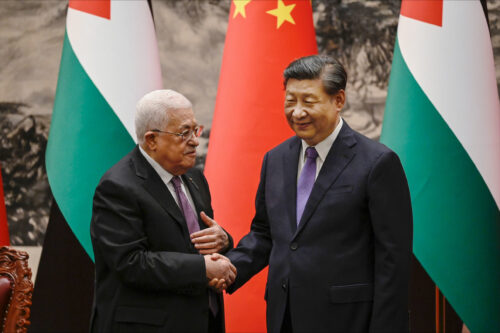Israel-China relationship in danger as state media blames Israel, U.S., and Jews for conflict
China’s Foreign Ministry and media have not criticized Hamas for the October 7 attack and have blamed Israel for the conflict. And there has been a dramatic spike in online antisemitism.

Since Hamas’s deadly attack on Israel last week, four Chinese citizens have been reported killed, as well as six injured and two missing. The family member of an Israeli diplomat was stabbed on Chinese soil. Chinese citizens in Israel have complained of a fumbled evacuation from the Jewish state.
Like countries across the world, China and its people have been directly impacted by the war continuing to unfold in the Middle East. But Beijing has attempted to remain “neutral” in its response to the conflict, underscoring its attempt to portray China as a non-aggressive power in the region in contrast to the United States.
That stance is seen as far from neutral by Israelis, who have interpreted China’s lack of condemnation of Hamas as the aggressor of the October 7 attack.
China wants to portray itself as “a great power on the one hand but a different kind of great power from the U.S. that has this kind of kinship with the Global South,” said John Calabrese, an assistant professor at American University’s School of International Service and a senior fellow at the Middle East Institute. “They’re trying to maneuver and shape their conduct in a way that can capitalize on that dual identity.”
This response is consistent with China’s decades-long diplomatic support for Palestine and calls for a two-state solution, even as China and Israel have developed a close economic relationship since establishing diplomatic ties in 1992.
Beijing’s posture also aligns China with its partners in the Middle East and will serve its regional interests there.

Israel-China relationship under strain
Israel and the United States were both disappointed by China’s refusal to specifically condemn Hamas’s October 7 attack on Israel or label it as terrorism. (Unlike Israel and several Western countries, China does not designate Hamas as a terrorist organization.)
And a surge in unfettered antisemitism in state-backed media and on social media in the past week — despite the country’s powerful censorship machine — will only continue to erode trust on Israel’s side, Israeli experts said.
“This conflict is going to create challenges for the relationship between these two countries in the short term,” said Carice Witte, the founder and executive director of SIGNAL, an Israeli think tank that studies China’s rise. “China is proud that it is friends with everyone in the Middle East. People have been asking how long they [can walk] this tightrope. It is difficult for Israelis to understand China’s position on the Hamas attack.”
China’s initial response the day after news broke of Hamas’s surprise assault on Israel — which left an estimated 1,200 Israelis dead — called for all parties to “remain calm, exercise restraint, and immediately end the hostilities to protect civilians and avoid further deterioration of the situation.” It did not specifically mention or condemn Hamas’s violence against Israelis but called for a two-state solution and the resumption of peace talks between Israel and Palestine.
After a meeting with senior officials in Beijing last week, U.S. Senate majority leader Chuck Schumer expressed “deep disappointment” with the initial Chinese statement on the Hamas attacks. Later that day, the Chinese Foreign Ministry slightly changed its tone: Spokesperson Máo Níng 毛宁 said at the daily press briefing that China was “deeply saddened by the civilian casualties caused by the conflict between Palestine and Israel.” She did not, however, once name Hamas, despite several questions from journalists that referred specifically to the militant organization.
“From China’s perspective, maintaining neutrality in this conflict is similar to the neutrality that it aims for with the Russian-Ukrainian war. How does one remain neutral when there is a clear-cut aggressor?” said Witte.
China’s ambitions to be a player in the Middle East
In communications with representatives from the UN, Europe, and the Middle East, Foreign Minister Wáng Yì 王毅 and China’s special envoy to the Middle East, Zhái Jùn 翟隽, have highlighted major priorities for the situation: Stop the fighting as soon as possible to prevent the conflict from spreading, abide by international humanitarian law and offer humanitarian assistance, exercise restraint among involved countries and work toward de-escalation, and resolve the question of Palestine with the help of the UN. China has also pledged humanitarian aid to Palestinians in Gaza.
After meeting with Egyptian Prime Minister Mostafa Madbouly on Thursday, Chinese leader Xí Jìnpíng 习近平 expressed China’s desire to play a role in coordinating a solution. According to China’s statement after the meeting, Madbouly and other Arab countries “highly appreciate China’s consistent and just position on the Palestinian question and expect China to play a bigger role in solving the current crisis.”
Despite efforts to outweigh U.S. influence in the Middle East, Secretary of State Antony Blinken’s diplomacy tour and Biden’s recent trip to Israel make it clear that the U.S. remains the preferred moderator in the region, said Calabrese — though China may be able to use its influence in Iran to help prevent a regional conflict.
“For all of the lamentation of the U.S. being out the door, that’s not true. This proves it and signals — even from those seeing the U.S. as a fickle ally — they’re still hoping the U.S. can do something,” Calabrese said.
Prime Minister Benjamin Netanyahu was expected to meet with Xi Jinping in Beijing this month, following a June meeting between Xi and Palestinian National Authority President Mahmoud Abbas.
Xi and Netanyahu were likely to discuss Iran, as well as possible areas for exchange and investment, Witte said. That visit now seems unlikely as the war remains hot in Israel and faces the threat of a greater regional conflict.

Why China won’t criticize Hamas
In Chinese media, reports have generally presented a one-sided, anti-Israel view of the war, said Tuvia Gering, a researcher at Israel’s Institute for National Security Studies. State media and commentators have blamed Israel’s treatment of Palestinians for the attack, as well as the United States for fanning tensions in the Middle East.
“The current round of conflict is the result of the U.S. policy of putting the cart before the horse in the Middle East, for which the U.S. should be held responsible,” wrote the Chinese nationalist tabloid the Global Times ahead of Biden’s visit to Israel on Tuesday, quoting Shanghai International Studies University professor Liú Zhōngmín 刘中民. “It is time for the U.S. to reflect and correct its longtime failed Middle East policy, which has led the Middle East peace process astray.”
“Because Palestinians are being attacked by Israel in retaliation, this is the perfect excuse now to use China’s powerful propaganda arm to mobilize against the U.S. through Israel,” Gering said.
“My sense is that a lot of the current rhetoric is coming out of the way Chinese authorities see Israel-Palestine as the site of a proxy war with the U.S.,” said Darren Byler, a Simon Fraser University researcher of mass surveillance in Xinjiang and a contributor to The China Project. “Ostensibly supporting restraint when it comes to the bombing of Gaza using U.S.-made funded or manufactured weapons is a strategy of opposing U.S. foreign policy and intervention. It is less about a concern for Palestinian autonomy and well-being.”
An added benefit of China’s repeated criticism of Israel’s treatment of Palestinians is support from the Arab world for one of China’s most important core interests — Xinjiang, where an estimated 1 million Uyghurs have been detained. Despite well-documented human rights abuses against Uyghurs and other Muslim and Turkic ethnic groups in the far western province known as Xinjiang Autonomous Uyghur Region, no Arab states have criticized China. In fact, the Arab League and the Organisation of Islamic Cooperation have both issued statements in support of China’s Xinjiang policies, and one outcome of Mahmoud Abbas’s June meeting with Xi Jinping was a joint statement that said, “Xinjiang-related issues are not human rights issues, but issues of anti-terrorism, de-radicalization, and anti-separatism.”
According to a Chinese Criminal Police University document made available by the Xinjiang Documentation Project, which is maintained by the University of British Columbia, Chinese authorities have tried to learn from the “success” of Israel’s counterterrorism tactics for its own counterterror strategy against Uyghurs.
Although criticism of Israel flows freely on Chinese social media, some Muslims in Xinjiang have gotten into trouble with authorities for associating with anti-Zionist sentiment. In one 2018 case, a Kazakh Muslim from Jeminay, Xinjiang, was sentenced to a total of 17 years in prison for “disturbing social order,” “propagating extremism,” and “using extremism to undermine the law.” Among evidence for that charge was the possession of texts about the Muslim Brotherhood and a memoir stating that men should “liberate Jerusalem from the Zionists,” according to a verdict shared by Byler.

Online antisemitism
The Israel-Hamas war has been a hot topic on Chinese social media since it broke out 10 days ago. But in addition to Israel and the United States, Jews have also been named as perpetrators — by internet users as well as state media.
On October 9, China Central Television (CCTV), China’s primary national television broadcaster, shared a video on Weibo outlining “the Israel factor” in U.S. elections. The reporter adds that “only 200 businesses impact the U.S. economy and controlling these companies are only six or seven Jews,” the reporter said in the video. “These factors can be used to exert incomparable influence on politics.”
The same day, the hashtag “Jews represent a mere 3% of the American population but control and manipulate more than 70% of its wealth,” a claim made by the CCTV reporter, was trending on Weibo. That claim continues to be recycled by commenters and content creators who seek to connect the war in Israel with perceived Jewish power in the West.
“This is why the Germans hated Jews so much back then,” one highly rated comment on the CCTV video read.
On Weibo, Hú Xījìn 胡锡进, the former editor of the nationalist newspaper the Global Times, wrote to his millions of followers: “Some of us should not be influenced by public opinion dominated by Jews and Americans.” Some netizens criticized Hu for his anti-Israel comments, pointing out that Chinese citizens, too, were killed by Hamas.
Anti-Israel and antisemitic comments reached such extremes that Israeli embassy accounts on Weibo began limiting comments on posts.
Conspiratorial discourse about Jews was prevalent in China — especially online — long before October 7. Researchers like Mary J. Ainslie of the University of Nottingham at Ningbo, who has researched antisemitism in China and Malaysia, have long warned that perceived “philosemitic” discourse could become antisemitic if left unchecked. That is exactly what has happened in the past several days.
The belief that Jews are extraordinarily wealthy and cunning and control American institutions like Wall Street and the media are common in China. These understandings about Jews have been labeled as “philosemitic” — meaning appreciative of Jews — as many Chinese admire the Jewish people for these stereotypical traits and seek to be more like them, as evidenced by the prevalence of Jewish-themed get-rich-quick books and educational programs popular across Asia.
“In East Asia…the line between philosemitism and antisemitism is much thinner [than in the west],” Ainslie told The China Project. “The encouraging of philosemitism, of positive racial stereotypes, in nations that practice racial politics like East and Southeast Asian nations is very dangerous because it encourages the forms of racial politics that are practiced already.”
Anti-Jewish discourse is deeply connected to anti-West, and especially anti-American sentiment. The idea that “the world’s money is in the pocket of the Americans, and the money of the Americans is in the pocket of the Jews” — a popular claim made in Chinese books and online posts about Jews — has become the basis for conspiracy theories parroted by both social media users and respected Chinese intellectuals, accusing Jews of everything from unleashing the global pandemic to attempting to stifle China’s rise.
The flood of uncensored antisemitic posts suggests an endorsement from Chinese authorities, Witte notes, and will be felt as an additional consequence in relations between China and Israel long after the war concludes.
“Not long ago there was a great deal of positive feeling in China regarding Jews and Israel as a Jewish nation. So this countermands those positive feelings and makes it easier to pursue a policy that is perceived as making sense for China in the context of the great power rivalry,” Witte said.






